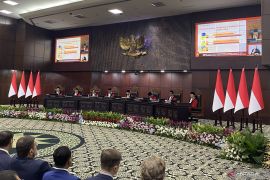"The new KUHP no longer focuses on sentences and imprisonment, as we know from the colonial legal system," he said at the Central Leadership National Coordination Meeting held in Bogor, West Java, on Thursday.
He disclosed that the new KUHP, which will take effect in 2026, will prioritize law enforcement through restorative justice.
This is because it is based on legal principles that are developing in society, he said.
"We are creating a new legal system based on the people, customary law, and religious law that are evolving in our society, in accordance with the philosophy of Pancasila," he remarked.
The government will prioritize deliberative efforts in resolving criminal problems, such as restoring victims' rights and enforcing sanctions against perpetrators, he said.
He explained that the deliberative approach has been taken to prevent conflict between parties. However, the implementation of restorative justice will need to be monitored by law enforcers, he added.
Mahendra assured that the new KUHP's implementation will not erase the concept of legal sanctions.
"If there is no other way (through restorative justice), then criminal law norms will be imposed by the state," he said.
He expressed optimism that the implementation of the new Criminal Code will ensure justice for all people, in keeping with President Prabowo Subianto's eight main missions, or Asta Cita, the first of which is reinforcing the Pancasila ideology, democracy, and human rights.
Related news: Govt apprises US, domestic business actors of new Criminal Code
Related news: UN letter on Criminal Code too late: deputy minister
Translator: Walda M, Kenzu
Editor: Anton Santoso
Copyright © ANTARA 2024











